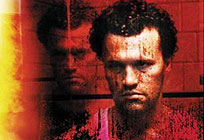|
|
|
|
Henry:
Portrait of a Serial Killer
|
 |
|
The debate about violence and censorship in film is perhaps more retrograde than it has ever been. Few participants in the discussion, it seems, ever seek to define their terms properly. As a result, gory exploitation films with explicit violence are confused with expertly thrilling films (like Cape Fear, 1991) or with those that confront or disturb on an emotional plane (like The Silence of the Lambs, 1991). The low-budget American cause célèbre Henry: Portrait of a Serial Killer is among the victims of such woolly thinking. It was rated R with cuts for Australia. Yet the film is far from being gross or sensationalist. Its most chilling moments only allude to brutal acts of violence, showing instead the aftermath. And only a deaf and blind critic could imagine that the film condones violence, or invites us to enjoy its representation. Originally shot in 1986, Henry is the debut feature of director John McNaughton. The artistic risks which McNaughton takes are clear triggers to moral hysteria: he presents his mass-murdering "hero" dispassionately, and refuses any easy resolution of the issues raised. Neither a horror movie nor an outraged social tract, Henry takes a disquietingly low-key, literal approach. As in another of his films, the remarkable Normal Life (1996), one could say that McNaughton presents psychological states in a non-psychological manner. The script (by McNaughton and Richard Fire) is based on the real-life case of Henry Lee Lucas. In between bouts of cold-blooded murder, Henry forms an unusual familial alliance with former prison mate Otis (Tom Towles) and the latter's sister, Becky (Tracy Arnolds). Henry is not presented as a monster; his behaviour is at times compellingly decent. Henry: Portrait of a Serial Killer is, finally, not really an intellectual film. McNaughton avoids any psychological speculation as to what makes this murderer tick. Yet, as we see and hear more of the brutal, proletarian world from which these characters come – a world of unemployment, child abuse, emotional deprivation and savage patriarchal values – we glimpse a truly frightening political perspective on a society gone mad. MORE McNaughton: Girls in Prison, Mad Dog and Glory, Speaking of Sex, Wild Things © Adrian Martin June 1992/September 2000 |
![]()